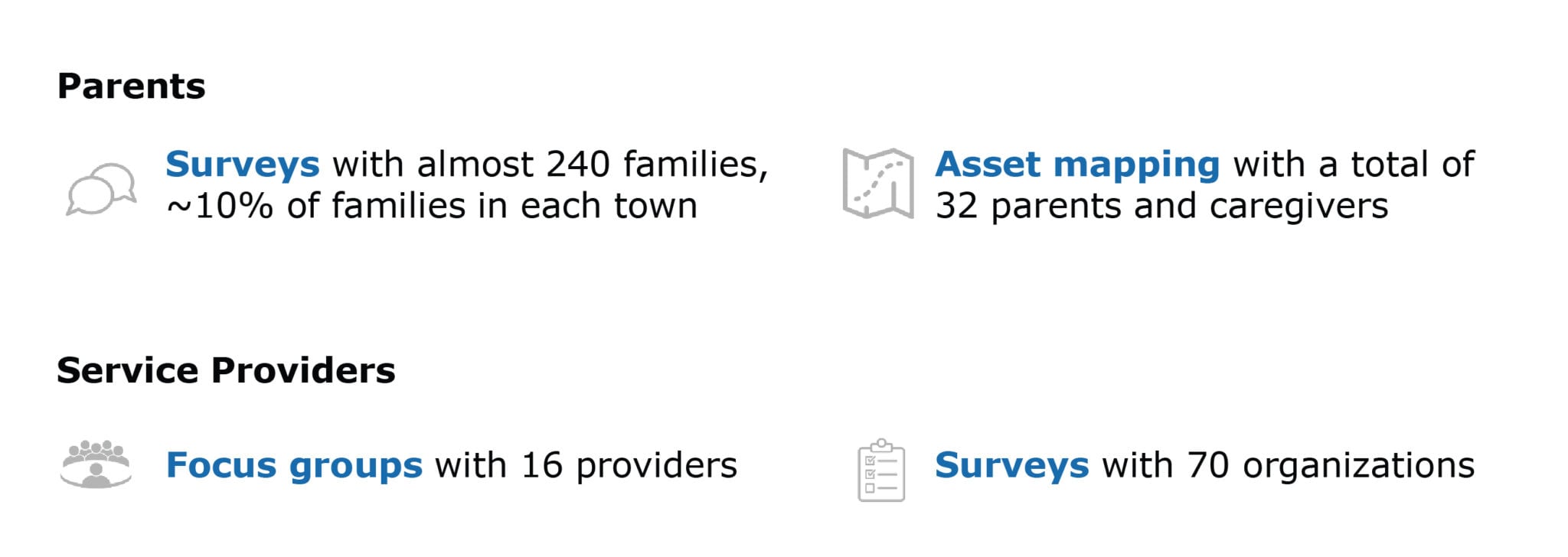

Three hours from both San Francisco and Los Angeles, Fresno County lies at the center of California’s Central Valley, home to farmland that grows a significant portion of the nation’s produce. Alongside the vast agricultural fields reside farmworkers and their families, in small towns far from Fresno’s urban core.
Families living in remote rural communities face distinct issues that funders and service providers need to account for when planning and implementing social programs. Working with First 5 Fresno County, we conducted a needs assessment in the towns of Huron and Mendota that highlights some of the unique challenges faced by rural communities. We also learned how residents stitch together resources and home-grown services to support one another. This needs assessment also informed our approach as evaluators, reaffirming the value of our community research principles when working in rural communities.

First 5 Fresno County, headquartered in the city of Fresno, invests in a wide variety of resources and supports to improve the lives of children and families in Fresno County. With input from First 5 Fresno County service providers, Huron and Mendota were chosen for this needs assessment because they embody many of the characteristics of agricultural towns across Fresno County and the broader Central Valley, including:
- a large immigrant population;
- a predominantly Latino/a community with many monolingual Spanish-speaking residents; and
- limited community infrastructure.
Our bilingual Spanish-speaking evaluation team used a mixed-methods approach to collect information from parents and caregivers of young children, as well as from organizations providing health, housing, child development, and other services to the two communities. Across the two towns, the data collected included:
Close-Knit Families
Data from face-to-face surveys with parents in grocery stores, night markets, and other community gathering spaces provided a nuanced picture of the strengths and challenges of life in small farming towns. Parents stressed the difficulty of living in remote rural areas – namely, lack of transportation, affordable housing, and access to amenities and services. Families struggle to support themselves because farm work does not pay enough to cover basic necessities, and finding jobs outside agriculture is difficult.
Parents overcome these challenges by relying on networks of friends and neighbors who share childcare, give rides to those without cars, and socialize in each other’s homes. One parent stressed the importance of these close-knit community networks: “We talk when we get together; we do barbeque or do a carne asada; we feel good when we’re with our family.” Strong and resilient families were ranked as a top community strength. As one provider explained, “These families are advocating for each other. Especially in a small, rural area, there [are] not a lot of services, so I think that the families are getting stronger and they’re making other families stronger.”
Schools at the Center of the Community
In both Huron and Mendota, families pointed to schools as key connection points for their communities. A majority of the parents we surveyed identified schools as one of the top three resources in their towns, making it the most mentioned asset in both communities.
Schools function as de facto community centers, providing gathering spaces and locations for accessing needed services. This included not only K-12 schools, but also Head Start and community college sites, which also provide services such as parenting and language classes. School playgrounds also feel safer than parks, so parents said they often meet each other at school and use the grounds for their children to play and get exercise.
Transportation Difficulties
Limited public transportation and the long distances between places in remote rural areas pose daily challenges to families living in Huron and Mendota. Many parents we spoke with did errands on foot despite poor quality sidewalks, few road signs, and summer temperatures that regularly top 90 degrees in these towns. Alternatives such as “Indigenous Ubers” have sprung up to fill the transportation gap for residents of these small towns, but they are not enough.
Transportation to and from school is especially hard for families with one car or without a car. “My daughter attends middle school [across town]” shared one parent, “[and] when my car breaks down, I can’t bring her.” Parents of children with special needs find it particularly hard to care for and educate their children because they must travel long distances to access early intervention services.
Transportation is also a challenge for the organizations that serve rural communities. Many organizations that provide services to these towns are actually based in larger towns outside the community. Finding staff who can travel to these remote areas can be difficult. As one provider explained, “One of our personnel problems out here sometimes in rural communities is just the staffing, finding someone who will travel out.”
Language Barriers to Accessing Services
Parents also noted that residents of poor rural towns struggle to access services. A lack of Spanish-speaking staff among service providers was emphasized as a particularly prominent challenge. In Mendota, for example, the need for services is high – 67 percent of children live in poverty – but many service providers do not speak Spanish and therefore cannot communicate with the majority Spanish-speaking population.
This needs assessment is contributing to efforts to spur better coordination between agencies that focus on rural areas in Fresno County. First 5 Fresno County led a series of three meetings with local stakeholders in both Huron and Mendota to share the findings and work with community members to address their needs. To improve the service system, service providers recommended (1) expanding resources (including funding) focused on families living in rural areas; (2) improving communication and coordination among agencies serving rural communities; and (3) creating sustainable partnerships between local agencies and county organizations. The full report is available on First 5 Fresno County’s website.

Key Practices for Community Research
For 30 years, our work at Harder+Company has focused on community research. Culturally-based evaluation methods and respectful engagement are hallmarks of our approach. This project underscored best practices for successful engagement with rural communities. These include:
- Employing a strengths-based perspective: Our research team approached this project with a focus on learning about community strengths. This helped us to develop a complex understanding of both the challenges faced by families, as well as their resiliency and the opportunities to build on their strengths.
- Collaborating with community partners: The needs assessment had an advisory group of agencies from Fresno County that offered introductions to service providers working in Huron and Mendota, and provided contextual information to support the research. Two women, each residents of Huron and Mendota, were instrumental in recruiting families and contributing to successful data collection efforts.
- Creating a research team that can relate to the communities: Our research team’s professional interests and personal backgrounds aligned well with both rural communities, with some team members from rural areas and others from Spanish-speaking or immigrant backgrounds. This helped our team build relationships with community members and made it so we felt personally connected to the work.
Our experience shows that engaging community members at every stage of the evaluation and learning process builds trust and improves our understanding of the community, which is key to developing more effective solutions.

